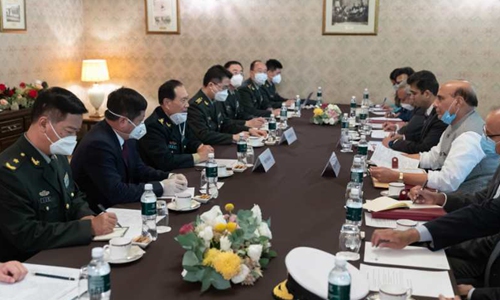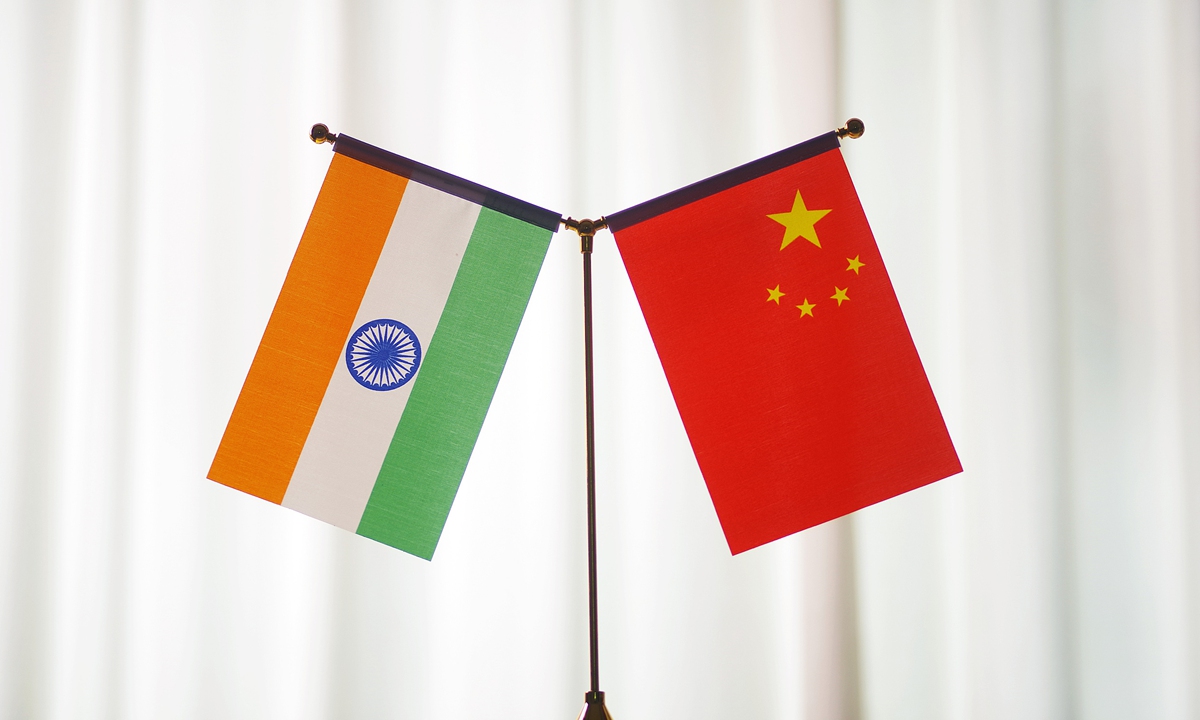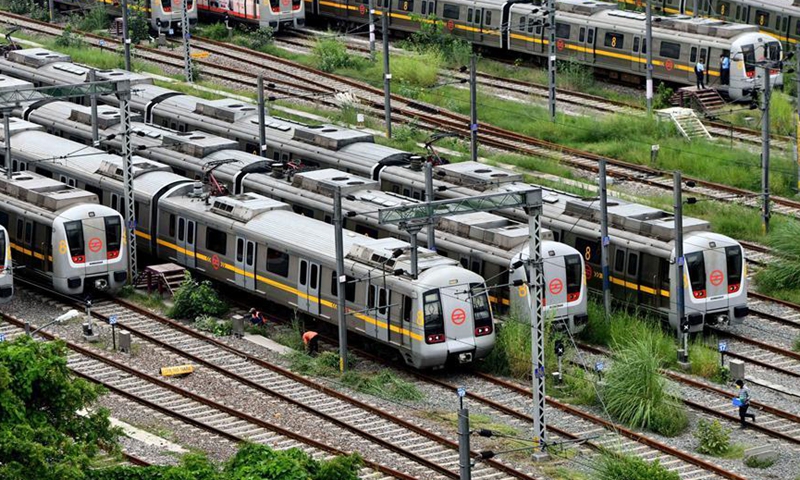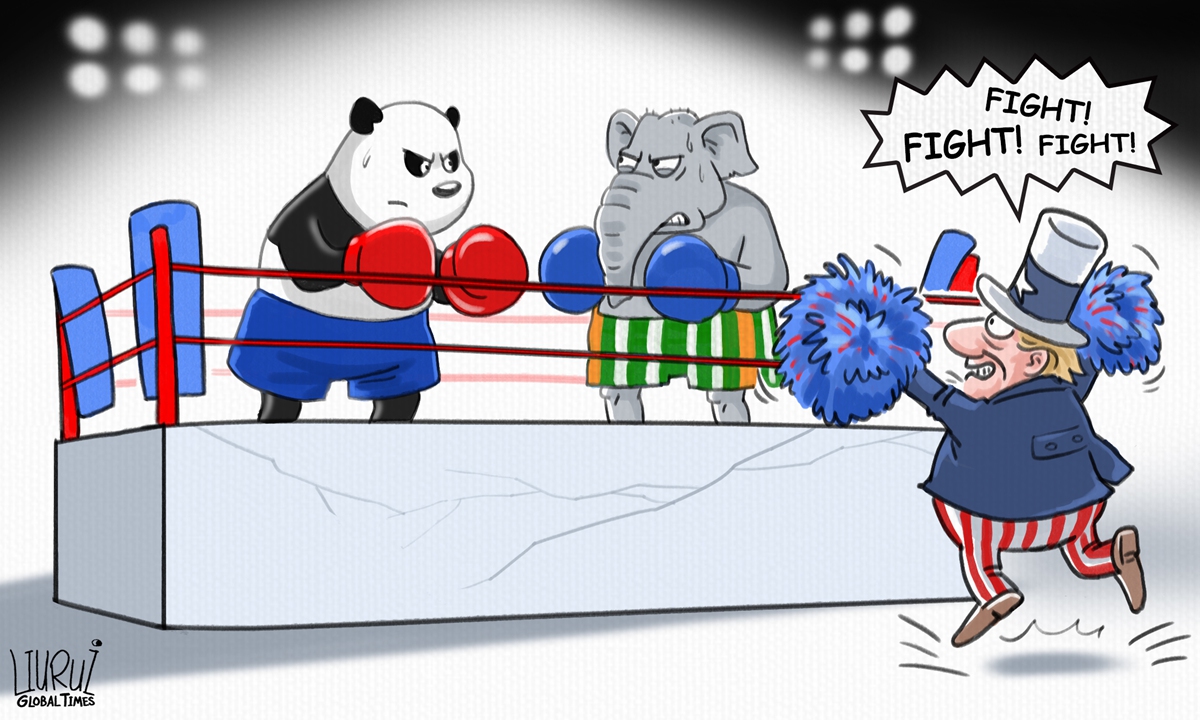New Delhi shows positive attitude, frontline Indian troops may remain over winter: expert
By Yang Sheng Source: Global Times Published: 2020/9/5 13:20:16 Last Updated: 2020/9/5 17:31:19

The defense ministers of China and India met on the sidelines of the Shanghai Cooperation Organization (SCO) meeting in Moscow, Russia on Friday, with Chinese Defense Minister Wei Fenghe expressing China's firm determination to defend its sovereignty and territorial integrity.
Leading Chinese experts said on Saturday that the unshakable will and military advantages of China might force India to return to reason and avoid a direct confrontation in the border region.
India bears full responsibility for the current China-India border tensions and China's military is fully determined, capable and confident to safeguard China's sovereignty and territorial integrity, and not an inch of Chinese territory can be lost, Chinese State Councilor and Defense Minister Wei Fenghe said during his meeting with his Indian counterpart Rajnath Singh Friday in Moscow.
The meeting on the sidelines of the defense minister's level meeting between members of the Shanghai Cooperation Organization (SCO) in Russia, was the first high-level, face-to-face meeting between Indian and Chinese senior officials since border tensions erupted along the Line of Actual Control (LAC) in eastern Ladakh in early May.
Singh said India hopes that the two sides will adopt a responsible attitude, fully disengage front-line forces as soon as possible, avoid taking measures that may escalate or complicate the situation, and avoid turning divergence into confrontations so as to bring bilateral military relations back to the right track as soon as possible.

Photo:VCG
Hu Zhiyong, a research fellow at the Institute of International Relations of the Shanghai Academy of Social Sciences, told the Global Times on Saturday that the meeting was a positive sign as both sides are seeking to deescalate serious tensions.
India has also expressed a willingness to resolve the problem peacefully, and the reasonable and positive attitude shown by the Indian defense minister could mean that New Delhi has realized that aggressive moves by Indian troops in the border region won't win any compromise from China, said Hu.
"By the end of September, winter will have arrived in the Ladakh region where temperatures could fall to minus 25 degrees, and India has deployed about 40,000 troops in the region. This is far beyond its logistics capability, and if the tension remained unresolved, the Indian military could see non-combat casualties," Hu noted.
India's aggressive moves earlier this year have forced the People's Liberation Army (PLA) to comprehensively strengthen its logistic capability in the face of a potential long-term stand-off, said a Chinese military expert familiar with the matter who asked not to be identified. Chinese troops in the region have built infrastructures that allow China to station more troops on the front line than India, the expert said.
China has deployed more forces with more advanced weapons to the region including anti-air troops, artillery troops and air force with more advanced fighter jets, and if India dares to further escalate the tensions, the PLA can seize air-domination and cause immediate and significant damage to Indian troops, and India's decision-makers appear to have learned these facts, which is why Indian senior officials released pragmatic signals recently, the expert said.
Indian External Affairs Minister Subrahmanyam Jaishankar said he might meet Chinese State Counselor and Foreign Minister Wang Yi in Moscow during a meeting of the SCO member states' foreign ministers in Moscow on September 10, Indian media Hindustan Times reported.
"As to what I will be talking with my Chinese colleague when I meet him - I mean, we have known each other a long time, so you can have a reasonable guess," Jaishankar said on Thursday without giving details.
Lin Minwang, deputy director at the Center for South Asian Studies at Fudan University, told the Global Times that India's foreign minister and defense minister both showed positive attitude to negotiations, and this could be regarded as a critical change in India's attitude since the crisis started in May, because they might now be aware that they can't get any compromise from China.
"India's foreign minister is actually more senior than the military leaders in the country's political system, so there is no divergence between the military and the foreign ministry, and those aggressive moves made by the frontline troops need permission from the foreign minister. Now, India's foreign ministry and the military are actually playing the old trick - good cop, bad cop. But they really want to end the crisis before winter.
Hu said India faces huge domestic pressure as it is losing control over the COVID-19 epidemic and facing a horrible economic recession and these two challenges further weaken India's capability to have a border confrontation with China, and now "the ball is on the Indian side."

Metro trains are parked at a yard in New Delhi, India, on Sept. 2, 2020. India entered the Unlock 4 with effect from Tuesday. Photo:Xinhua
According to the latest data released by the coronavirus resource center of Johns Hopkins University on Saturday, India has 4,023,179 confirmed cases and 69,561 deaths. The fast growing number has made India the second epicenter of the COVID-19, beside the US
Data from the Indian government on Monday showed that its economy, which was among the world's fastest-growing, contracted by 23.9 percent in between April and June, its steepest fall on record and the worst performance among major economies.
Hu said Prime Minister Narendra Modi and his Bharatiya Janata Party (BJP) Modi are facing much heavier domestic pressure than the Chinese government, even with the US showing its aggressive posture in the West Pacific against China. This is because the opposition, the Indian National Congress party, has been waiting for such a chance to shake the BJP by heavily criticizing the Modi administration for its disappointing domestic governance and risky foreign policy.

Photo: GT
During an online event organized by the Observer Research Foundation on Thursday, Jaishankar also criticized the US for its unilateralism and behavior of "disrupting the world in order to get better terms from the world."
Hu said by criticizing the US, Jaishankar might want to reinforce and emphasize the image of India's independent diplomatic strategy, as the outside world might believe New Delhi has decided to become "a US follower and serve the US-proposed Indo-Pacific strategy" due to its recent hostile moves against China.
India can choose to step back and peacefully deescalate the tensions, or venturesomely challenge China's determination and risk the lives of Indian soldiers to maintain or escalate tensions, and China's stance will remain unchanged and the advantages are unshakable, Hu noted.
Hu said "if Wang and Jaishankar meet, the two sides could reach a further agreement to deescalate the tensions."
China should still remain cautious and prepare for the worst-case scenario, as India could still order its border troops to remain in the region during the hard winter even if that were to cause non-combat casualties, because New Delhi worries that ending the crisis in a peaceful way with China could be regarded as a failure that would disappoint domestic nationalists, Lin warned.
RELATED ARTICLES:
Posted in: DIPLOMACY,CHINA-INDIA